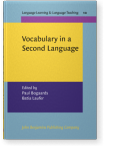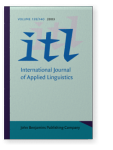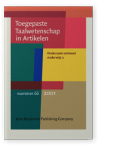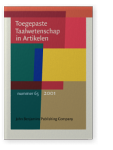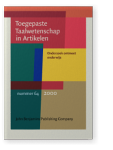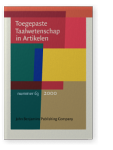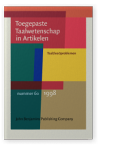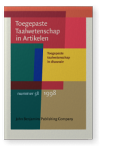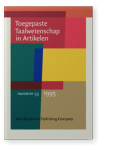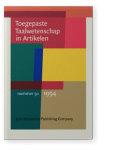Lydius Nienhuis
List of John Benjamins publications for which Lydius Nienhuis plays a role.
2004 10. The construction and validation of a deep word knowledge test for advanced learners of French Vocabulary in a Second Language: Selection, acquisition, and testing, Bogaards, Paul and Batia Laufer (eds.), pp. 191–208 | Chapter
2003 Translating ambiguous and nonambiguous Words in a foreign Language ITL - International Journal of Applied Linguistics 139/140, pp. 129–152 | Article
The research to be reported on in this paper was originally motivated by the finding that about 70% of the mistakes made by university students when translating from their mother tongue (Dutch) into their foreign language (French) were lexical in nature (NIENHUIS et al. 1989). This was partially… read more
2001 Diepe Woordkennis als Maat Voor Algemene Taalvaardigheid? Onderzoek ontmoet onderwijs 2, pp. 69–77 | Article
This paper describes an investigation into the relation between the results of a newly developed test of deep word knowledge (DWK) and a series of other word knowledge tests as well as a writing task. The DWK consists of 63 items constructed along the following model: one stimulus plus 6 responses. read more
2001 Voorwoord Onderzoek ontmoet onderwijs 2, pp. 7–8 | Article
2001 Voorwoord Toegepaste Taalwetenschap in Artikelen 65, pp. 7–8 | Article
2000 Het Toetsen van Diepe Woordkennis in een Vreemde Taal Onderzoek ontmoet onderwijs, pp. 107–115 | Article
In this article, we report on the construction of a test of deep word knowledge in French as a second language that can be used at advanced levels of proficiency. By 'deep word knowledge' we mean the knowledge of the semantic network of L2-words; our test focuses on the knowledge of the relations… read more
2000 Leessnelheid in Vreemde Talen Toegepaste Taalwetenschap in Artikelen 63, pp. 33–40 | Article
This paper presents the results of two studies on the reading rate of students after 5 years of secondary education, including French and English as foreign languages. The reading processes investigated were, in the terminology of Carver, rauding (i.e. 'normal' reading), scanning and learning. As… read more
1998 Voorwoord Taal(leer)problemen, pp. 7–8 | Article
1998 Bimodale Aanbieding en Consolidatie Bij Woord-Verwerving: Het Effect Van Verklanking op Retentie l Toegepaste taalwetenschap in discussie, pp. 185–192 | Article
In this article we address the question whether in word learning the effects of a bimodal (reading and pronouncing) condition are superior to the effects obtained in a monomodal (written only) condition. Research in the domains of psychology, psycholinguistics and foreign language learning lends… read more
1998 Woordenboekgebruik en Tekstbegrip Toegepaste taalwetenschap in discussie, pp. 155–162 | Article
This article describes an empirical study on the effect of dictionary use on scores of reading comprehension tests for advanced levels of French, as well as the effect on certain aspects of learner behaviour. For a more detailed description, see Weistra (1997). In this research project, groups of… read more
1995 Voorwoord Toegepaste Taalwetenschap in Artikelen 53, pp. 5–8 | Article
1994 Polysemie En Vertaling In Een Vreemde Taal: Een Experimenteel Onderzoek Toegepaste Taalwetenschap in Artikelen 50, pp. 145–156 | Article
In this article we address the question whether polysemous words are more difficult to translate than monosemous words. If the two different meanings of a polysemous word have to be translated by two different words in the target language, the translator wil have to select the right one. We… read more
